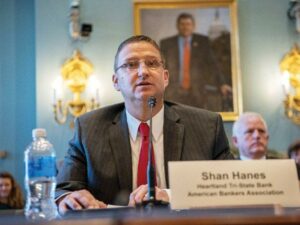
The dominant role of former Heartland Tri-State Bank CEO Shan Hanes both at his bank and in the local community was a major factor in the failure of the bank last summer, according to a Feb. 7 Federal Reserve Office of the Inspector General report.
Hanes was indicted earlier this month in the U.S. District Court of Kansas for allegedly embezzling $47.1 million from the bank through 10 wire transfers from May 30 to July 7, 2023. The theft was allegedly tied to Hanes being victimized by a cryptocurrency “pig butchering” scheme in which scammers persuade victims to invest in seemingly above-board virtual currency investment opportunities before stealing their money. The embezzlement allegedly directly led to the collapse of the $139 million bank on July 28.
Hired as an ag loan officer in 1993 at Heartland Tri-State predecessor First National Bank of Elkhart, Hanes was named president/CEO in 2008. Three years later, Hanes brought a local investment group together to acquire the bank from its former holding company. The bank was renamed Heartland Tri-State Bank in 2017. One of the largest shareholders at the $139 million bank, Hanes was also an advocate for the banking industry, having chaired the Kansas Bankers Association in 2022 and served on the American Bankers Association’s Ag and Rural Banker Committee from 2015-19.
Hanes reportedly remained “highly involved” with the daily operations of Heartland Tri-State Bank leading up to its collapse. According to the report, senior bank employees avoided Heartland Tri-State’s daily wire limits of $5 million per sender to authorize and process Hanes’ fraudulent wire transfer requests, after the CEO allegedly instructed employees to execute the transactions for his benefit.
The report provided a detailed timeline of wire transfers in the weeks leading up to the failure. Hanes had already allegedly transferred $30.8 million from the bank by the time Heartland Tri-State’s board of directors reduced the bank’s daily wire limit for account holders to $3 million from $5 million. However, Hanes allegedly exceeded the new limit several times, including $3.3 million on June 27; $8 million on July 5; and $4.4 million on July 7. Heartland Tri-State employees reportedly did not follow BSA/AML policies to remain on alert for potential suspicious transactions.
Heartland Tri-State Bank reportedly funded Hanes’ wire transfers by using $24 million in its line of credit at a correspondent bank — leaving only $700,000 unused — and by borrowing $21 million from the Federal Home Loan Bank system.
“Significant internal control breakdowns and the influence of the CEO as a dominant management official created an opportunity for the series of apparently fraudulent wire transfers to be initiated and processed,” according to the report. “These wire transfers significantly impaired Heartland’s capital and liquidity, causing the bank to become insolvent.”
According to the report, the Federal Reserve Bank of Kansas City initiated a target examination on Heartland Tri-State on July 25 after a top executive contacted both the agency and the Kansas Office of the State Bank Commissioner to discuss the alleged fraud and the bank’s worsening condition. FRB Kansas City examiners found that the severity of the bank’s problems “appeared to be beyond the ability of the bank’s board and management to control or correct.” Heartland Tri-State’s CAMELS composite rating was downgraded to critically deficient.
During the week of the bank’s failure, Hanes reportedly provided FRB Kansas City staff with screenshots of messages and supposed crypto account statements. Hanes had allegedly begun investing his own personal funds into crypto in December 2022. According to the Federal Government, Hanes used embezzled funds from a local church and investment club to invest in crypto early the following year. “Reserve Bank staff found the CEO’s explanations for his activities to be unreliable and inaccurate because the CEO’s explanations for the transaction did not make sense and were difficult to follow,” according to the OIG.
After the bank failed, Kansas State Bank Commissioner David Herndon appointed the FDIC as receiver. The FDIC entered into a purchase-and-assumption agreement with Syracuse, Kan.-based Dream First Bank, NA, to assume all of the deposits of Heartland Tri-State Bank.
The FDIC later estimated that the Heartland Tri-State bailout cost its Deposit Insurance Fund $54.2 million. The bank’s four branches reopened three days later as locations of Syracuse, Kan.-based Dream First Bank.
Hanes faces a maximum sentence of 30 years in prison and a $1 million fine.
